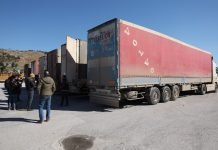
Devastating earthquakes in early February damaged more than 20 percent of agricultural production in Turkey, according to a recent report from the United Nations Office for the Coordination of Humanitarian Affairs (OCHA).
The earthquakes’ impact on the country’s agriculture includes severe damage to crops, livestock and rural infrastructure, which has an immediate and longer-term impact on the availability of food, the OCHA said.
A 7.8-magnitude earthquake that struck near the Turkish city of Gaziantep – home to around 2 million people and on the border with Syria – as people were sleeping on February 6 was followed by dozens of aftershocks, including a 7.5-magnitude temblor that jolted the region in the middle of search and rescue efforts the same day.
According to the OCHA many people, particularly in rural areas, are still living in extremely difficult conditions due to the scale of the disaster.
“Many rural communities chose to settle close to their damaged homes because of their deep ties to the land,” the OCHA said, adding, “Leaving behind their agricultural land and livestock — their primary sources of income and livelihood — was not an option.”
“The earthquake-affected region, known as Turkey’s ‘fertile crescent,’ accounts for nearly 15 percent of agricultural GDP and contributes to almost 20 percent of Turkey’s agrifood exports,” the Food and Agriculture Organization (FAO) earlier said.
According to the FAO, the quakes caused $1.3 billion in damage through the destruction of infrastructure, livestock and crops, and $5.1 billion in losses to the agriculture sector.
UN agencies have repeatedly called on the international community to increase its efforts to ensure aid keeps reaching the millions of people affected by the major earthquakes.
According to relief organizations, the impact of the earthquakes will be felt for months and years to come.
Around 2.7 million people remain internally displaced in the country. Shelter, water sanitation facilities, healthcare, protection (including mental health and psychosocial support) and continuity of learning remain priority needs, according to UNICEF Turkey.
The damage in Turkey alone could amount to over $100 billion, the UN said and launched a $1 billion funding appeal to support millions of people in Turkey.














